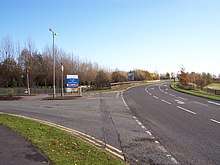Ashworth Hospital
| Ashworth Hospital | |
|---|---|
| Mersey Care NHS Foundation Trust | |
 Entrance to Ashworth Hospital off School Lane | |
 Location in Merseyside | |
| Geography | |
| Location | Maghull, Merseyside, England |
| Coordinates | 53°31′13″N 2°54′39″W / 53.52019°N 2.91094°WCoordinates: 53°31′13″N 2°54′39″W / 53.52019°N 2.91094°W |
| Organisation | |
| Care system | NHS |
| Hospital type | Psychiatric |
| Services | |
| Emergency department | No |
| Links | |
| Website |
www |
| Lists | Hospitals in England |
| Part of a series on |
| Psychology |
|---|
 |
|
Ashworth Hospital is a high-security psychiatric hospital at Maghull in Merseyside, England. It operates on behalf of Mersey Care NHS Foundation Trust, catering to patients with psychiatric health needs that require treatment in conditions of high security.
Ashworth is one of only three high security psychiatric hospitals in England, alongside Broadmoor Hospital in Berkshire and Rampton Secure Hospital in Nottinghamshire.
History
Ashworth was formed from the merger of Moss Side Hospital and Park Lane Hospital, opened as a Broadmoor overspill unit in the early 1970s.[1]
Following the death of a patient in 1988 and a series of other serious allegations, a Committee of Inquiry into Complaints about Ashworth Hospital, Merseyside headed by Sir Louis Blom-Cooper was set up and published its findings in 1992. Blom-Cooper was highly critical of the regime which was felt to be more custodial than therapeutic. 7 staff and 2 managers were relieved of their duties.[2]
In 1997 a patient absconded from a day rehabilitation trip in protest against his treatment and the management of the Personality Disorder Unit. The Fallon inquiry was established to investigate the allegations and reported in 1999.[3] As a result of the Fallon Inquiry, a review into security was undertaken by Sir Richard Tilt who recommended that security be upgraded to that of a Category B prison.[4]
Organisation
Ashworth is one of the three high-security psychiatric hospitals in England and Wales, alongside Rampton and Broadmoor, that exist to work with people who require treatment due to their "dangerous, violent or criminal propensities", with the majority experiencing psychotic conditions such as schizophrenia,[1] comorbid or other personality disorders.[5] It is managed by Mersey Care NHS Foundation Trust. Ashworth currently has 14 wards.[6]
A wide variety of pharmacological, rehabilitative and psychological treatments are available.[7][8] Rehabilitative and creative activity is supported with patients frequently entering work for the Koestler awards winning 27 prizes in 2011.[9] In collaboration with The Reader Organisation[10] reading groups have been set up in which staff and patients read literature together, promoting confidence and developing communication and other skills.[11][12]
Patients of note
- Ian Brady, one of the "Moors Murderers", who was at Ashworth for more than 30 years after being transferred from a mainstream prison in November 1985. Brady remained there until his death in May 2017; he had been in custody for more than 50 years.[13]
- Dale Cregan, convicted of murdering four people (including two female police officers) in Greater Manchester during 2012, he was transferred from a mainstream prison shortly after his conviction in 2013.[14]
- Charles Salvador, armed robber, born as Michael Peterson and formerly known as Charles Bronson[15]
- Robert Sartin, responsible for the Monkseaton shootings in April 1989, where one man was killed and 14 other people were injured.[16]
- Barry Williams, also known as Harry Street, multiple murder and possession of explosives, spent 15 years there after a killing spree in West Bromwich in 1978. He was returned to the hospital in 2014 for firearms offences and making threats against a neighbour in Birmingham,[17] and died from a heart attack shortly after returning to Ashworth.[18]
See also
References
- 1 2 Moritz, Judith (19 July 2013). "Inside Ashworth Hospital: Life with Britain's most violent patients". BBC News. Retrieved 13 October 2017.
- ↑ "Death in seclusion remains a mystery: Ashworth inquiry". The Independent. 1992-08-06. Retrieved 2018-01-28.
- ↑ "Health | Ashworth: A catalogue of shame". BBC News. 1999-01-12. Retrieved 2018-07-23.
- ↑ David Brindle. "The hardline legacy of Fallon | Society". The Guardian. Retrieved 2018-07-23.
- ↑ "Ashworth Hospital". Mersey Care NHS Trust. Archived from the original on 5 October 2013. Retrieved 29 September 2013.
- ↑ "Ashworth Hospital: Patient services". Mersey Care NHS Trust. Archived from the original on 16 December 2013. Retrieved 29 September 2013.
- ↑ "Ashworth Hospital: Services provided". Mersey Care NHS Trust. Archived from the original on 16 December 2013. Retrieved 29 September 2013.
- ↑ "Ashworth Hospital: Psychological Practice". Mersey Care NHS Trust. Archived from the original on 22 August 2012. Retrieved 29 September 2013.
- ↑ "2011 awards results" (PDF). Koestler Trust. 13 December 2011. Archived from the original (PDF) on 2 July 2013. Retrieved 29 September 2013.
- ↑ "World Mental Health Day". The Reader Organisation. 10 October 2013. Retrieved 29 September 2013.
- ↑ Weston, Mary; McCann, Eleanor (2010). "Get into Reading with Mersey Care NHS Trust". Mental Health and Social Inclusion. Emerald Group Publishing Limited. 15 (1). ISSN 2042-8308. Retrieved 29 September 2013.
- ↑ Dyer, Lindsey (1 May 2010). "Setting up a reading group". Mental Health Practice. 13 (8). doi:10.7748/mhp2010.05.13.8.21.c7729/. Retrieved 29 September 2013.
- ↑ Whitehead, Sarah (19 May 2017). "Ian Brady's psychiatric nurses speak of 'daily miracle' of treating him". The Guardian. Retrieved 29 September 2017.
- ↑ 14:44, 25 MAR 2018Updated18:58, 25 MAR 2018 (2018-03-25). "Police killer Dale Cregan 'moved from secure psychiatric hospital back to Strangeways'". Manchester Evening News. Retrieved 2018-07-23.
- ↑ Bronson 2000, p. 126
- ↑ Scott, Sarah (11 January 2013). "Crimes that shocked Tyneside: Robert Sartin's Monkseaton rampage". nechronicle. Retrieved 13 October 2017.
- ↑ 22:00, 27 DEC 2014Updated08:20, 28 DEC 2014 (1978-10-27). "West Bromwich serial killer Barry Williams, who gunned down five people in 1978, dies in hospital - Birmingham Live". Birminghammail.co.uk. Retrieved 2018-07-23.
- ↑ "Mass killer Harry Street - who shot dead five people - dies in hospital". Express and Star. 28 December 2014. Retrieved 28 December 2014.
Sources
- Bronson, Charles; Ackroyd, Robin (2000). Bronson. London: John Blake Publishing Ltd. p. 167. ISBN 1-85782-393-1.
Further reading
- Walker, George (2012). Ashworth - A Debt Never Paid (Part 2). CreateSpace. ISBN 978-1479174065.